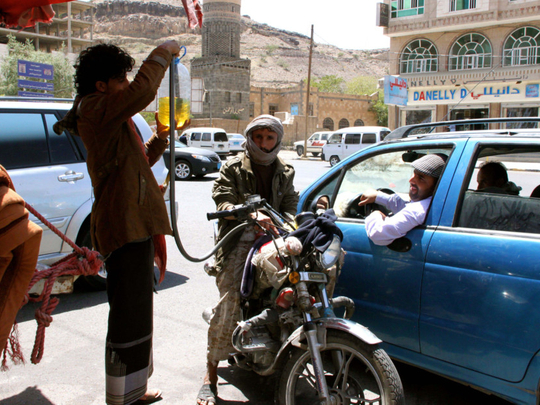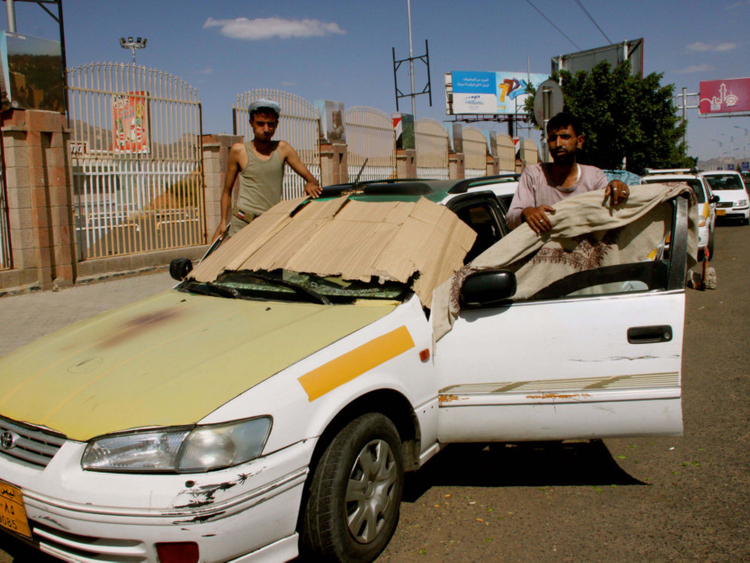
Taiz: Yemenis who warmed up to the idea of a ‘revolution’ when Al Houthis unexpectedly swept into power in September last year want them gone. In the capital’s streets, during Eid, there was no dearth in discussion about living conditions, which have irreversibly deteriorated after the militia took charge.
After a year of Al Houthi rule, businesses have shut, external investments stopped pouring in and people have lost their jobs. A significant number have lost their homes, and are temporarily seeking shelter in their relatives’ houses or have moved abroad to visa-free countries like Jordan and Malaysia. The prices of food, fuel and medicine have skyrocketed.
At a gas station in Hadda long queues of cars run into several kilometres.
Those who don’t have the luxury of time are forced to buy fuel in the black market for six times the price at 18,000 Yemeni rial for a 20-litre barrel. Before the Al Houthis came to power, taxi driver Abdul Khalid recalled it was 3000 rials.
This year, employees didn’t travel home for the Eid holidays. Mohammad Sohaibi, who studied tourism management in Taiz University decided to stay behind and continue his work as a receptionist at one of the few surviving hotels in Al Zubairi street.
“Who knows, if I will have this job tomorrow,” he says.
As a result of the hike in fuel prices, the transport fare to his hometown in Al Turbah has doubled. A single journey that would have cost 3000 rials by bus has more than doubled. “Food has become very expensive. Anything that was 100 rials has become 300 rials,” he said.
Pointing to a plastic bottle of water, Sohaibi adds, this was 50 rials, now it is 150 rials. He added that life is difficult, not only for him, but more importantly for families, who were struggling even before the war.
Yemen was already suffering from acute water shortages, but the last six months has thrown a further 5 million into desperation.
In a street next to Berlin Gardens, Asma Ali is waiting to fill her six yellow jerry cans. A huge tank sits on the pathway and women and children jostle to the front to fill up water for cooking and washing. “We are tired of living like this, we want peace and safety, not Al Houthis,” she says.
But there are others who feel Al Houthis are not entirely to blame.
Ahmad Ali, a security officer at the Royal Crown hotel, said if Saudi Arabia didn’t enforce a siege at seaport towns and the borders, the militia wouldn’t struggle to import food, fuel and resources.
Meanwhile, a noticeably pensive Sultan Assrahi is chewing qat, a mild narcotic, on the pavement outside his home on Al Baghdad street. Assrahi’s work as a mechanic has been infrequent after his key clientele relocated outside Yemen, or travelled to nearby villages in the South.
“My son died of leukaemia, I didn’t have the money to pay for his medical treatment.” he says.
“With Al Houthis nothing is good. Yemen is expensive — gas, petrol, medicine. A lot of people have left Sana’a,” he said, pointing to a nearby street of empty residential blocks.
Assrahi said when Al Houthis came they promised they would slash fuel prices, but now they are selling fuel on the black market at six times the price.
While Assrahi and his children are up all night due to the air raids, they insist it’s still better than the militias’ indiscriminate shelling.
“Without Al Houthis, Saudi would not bomb us,” he insists.
Sohaibi said the militia just gave the capital more bombs. “There is death everywhere — in the market, in the mosque, in your home, hotel — no where is safe.”
In dire economic conditions, where jobs are far and few, Fuad Al Yousufi from Taiz works two jobs in Sana’a to make ends meet.
In the daytime he distributes phone cards for telecom companies and by night he works as a security guard in a private company for residential homes. Like Sohaibi, he too, was unable to join his family for Eid.
“Everything is expensive, I can’t think about petrol,” he says, showing his scooter covered in layers of dust, and unused for months.
Another reason why Al Yousufi can’t return home, he says, “Taiz is unsafe where Al Houthis are indiscriminately killing people. Many people just want Al Houthis to leave us alone, so we can return to our lives.”
— Charlene Anne is a freelance journalist based in Taiz













